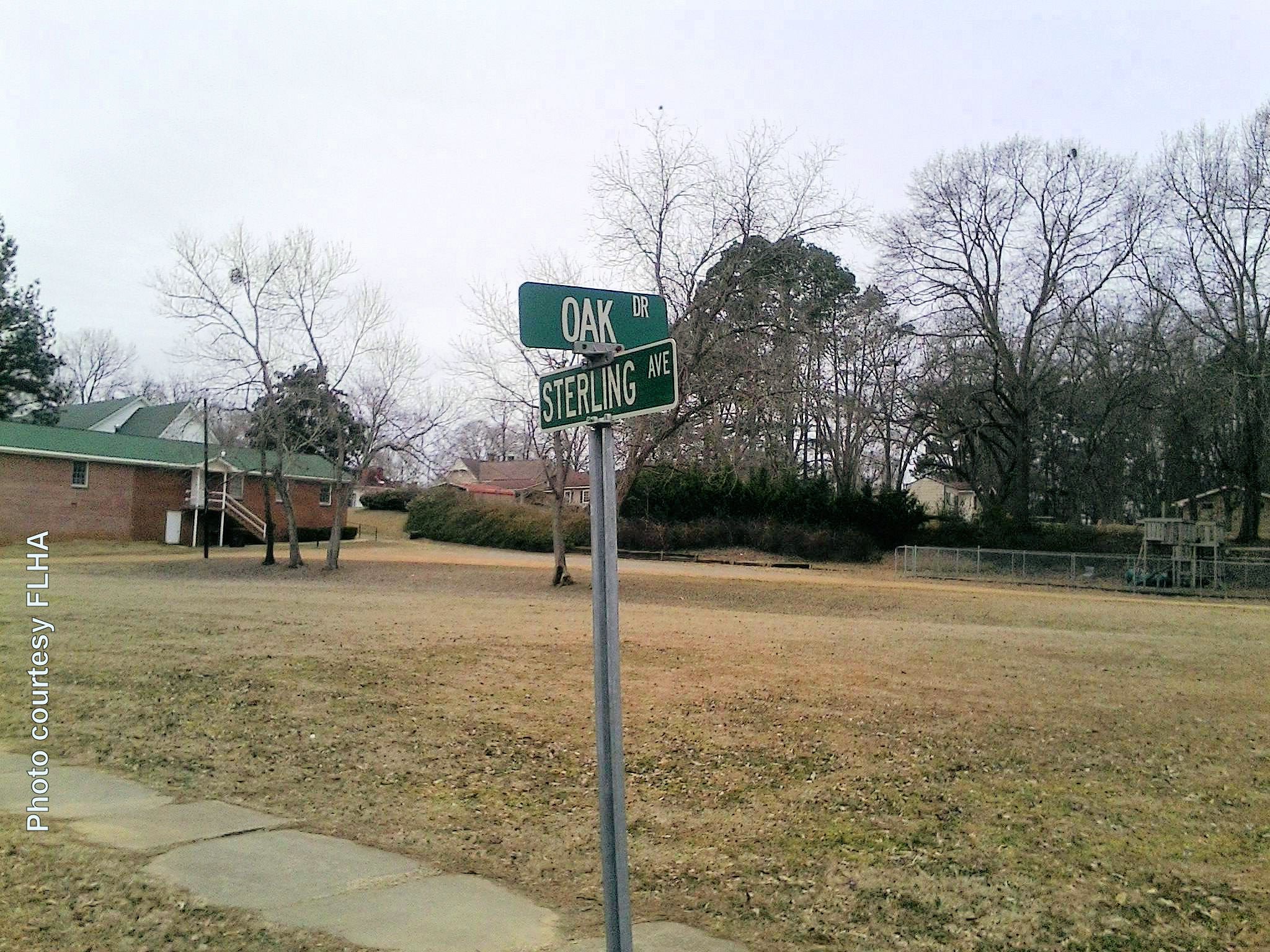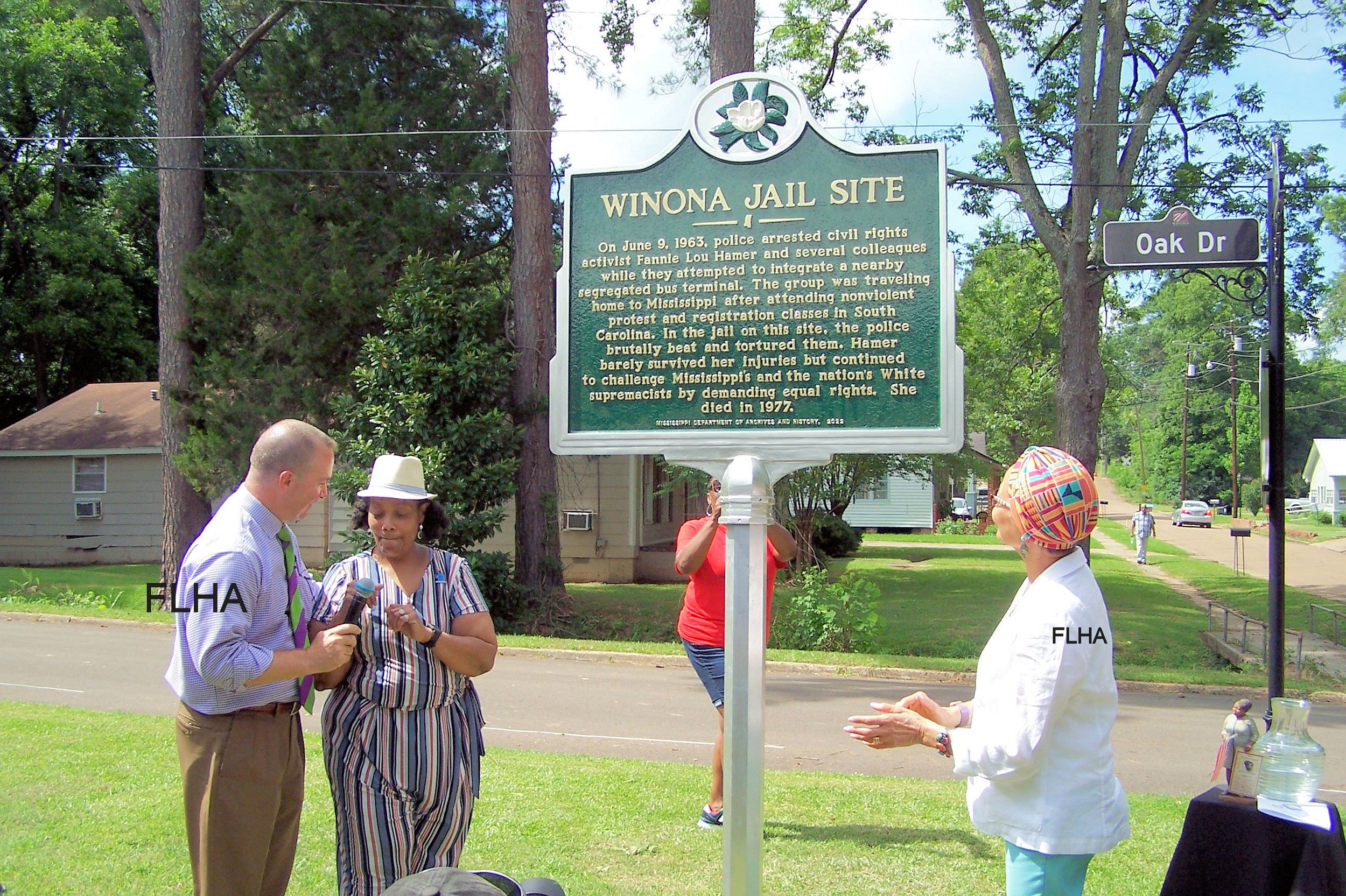Mississippi State Historical Marker
Winona, Mississippi
Unveiling and Dedication: June 9, 2022
Location: The corner of Oak Avenue and Sterling Street, Winona, MS
Nearly 60 years after Fannie Lou Hamer and several others, including a 15-year-old girl, were beaten in jail at the hands of local law enforcement, a historical marker was unveiled at that site in Winona, MS on June 9, 2022, commemorating the historic assault.
After numerous attempts and several years of effort by Winona native Vickie Roberts-Ratliff, the Mississippi State Historical Marker was unveiled at an official ceremony where the jail once stood on the corner of Oak Drive and Sterling Avenue in Winona. The event was attended by hundreds including Hamer’s last living child, Jacqueline Hamer Flakes and Euvester Simpson, who at the age of 17, shared a jail cell with Hamer following their arrest in 1963. “I haven’t been back to Winona, since that happened,” Simpson said. I’ve gone past Winona. I’ve gone around Winona. But I never stopped until today.”
Hamer, Simpson and eight other activists were returning from a voter registration workshop in South Carolina, when their Continental Trailways Bus stopped in Winona on Sunday, June 9, 1963. Winona’s police chief and a highway patrolman were waiting for them; reportedly, the driver had stopped before reaching Winona and made a telephone call.
Simpson, Annell Ponder, June Johnson (age 15), Rosemary Freeman, Ruth Davis and James West got off the bus to use the restroom and then sat at the lunch counter at Staley’s Café. Hamer remained on the bus. When her colleagues were quickly ushered out of the café, Hamer stepped off the bus to see what had occurred. All were taken into police custody, including Hamer, who was kicked by a police officer as she entered the squad car.
Hamer was viciously beaten by two Black inmates, Solomon Poe and Roosevelt Knox, who were ordered to do so by jail officials or face the same fate themselves. One inmate beat Hamer until he was exhausted, then the other took the blackjack. He too beat Hamer until he was exhausted, and she had passed out. She and the others were released on bond three days later.
The searing trauma of what happened in Winona was always present in Hamer’s speeches, interviews, and oral histories. The beating also catalyzed her activism. Until now, the City of Winona has said little, if anything, about the horrific events that occurred within its metaphoric walls. Fifty-nine years later, however, that silence has been broken.
Civil Rights Activist Euvester Simpson
Program from the unveiling
Winona, MS Mayor Aaron Dees
“Right here, right in this very place that we have gathered, Fannie Lou [Hamer] was arrested and beaten for attempting to help Black society to register to vote,” said Winona’s current mayor Aaron Dees during the dedication ceremony. “She would leave Winona, Mississippi with a severely damaged right kidney and vision issues from the left eye…Fannie Lou Hamer's deepest passion was trying to get this nation to come together in complete unity…Let us trample out the hate from the past, which tries to echo its horrific voice into our present and on into our future.”
In April, the City of Winona’s Board of Aldermen unanimously approved a proclamation declaring an annual observation of June 9th as Fannie Lou Hamer Day. Proclamations were also presented from the Mississippi State Legislature and the office of U.S. Congressman Bennie Thompson, who worked with Hamer.
“We are grateful and honored to have received encouragement, acknowledgement, and resources from civic, city, county, state, and national entities,” said Vickie Roberts-Ratliff, who spearheaded the marker effort. “Without the graciousness of Sacred Heart Catholic Church, the owner of the property where the jail once stood, our efforts to commemorate and honor Mrs. Hamer would not have come to fruition.“
Jacqueline Hamer Flakes (l) and Euvester Simpson address the crowd before the unveiling
Euvester Simpson, Benita Knox (c) and Flakes sing, Walk With Me, as they approach the new marker on Sterling and Oak Street in Winona. MS State Rep. De'Keither Stamps is in the foreground
Flakes and Simpson pull the bow to unveil the marker honoring Fannie Lou Hamer
Flakes and Simpson read the marker in Winona, MS recognizes that Fannie Lou Hamer and others were savagely beaten at the jail on that site in June 1963. Simpson (r) was in the same jail cell as Hamer
Members of Fannie Lou Hamer's family, including her niece, Marily Mays (left - in white) attended the event
One of the event organizers, Vickie Roberts-Ratliff (c), addresses the crowd. Roberts-Ratliff spearheaded the placement of the marker in her hometown of Winona
Vickie Roberts-Ratliff said she reached out to Winona city officials for several years to have a historic marker honoring Hamer placed at the site. But it was only after uniting with author Kate Clifford Larson, Dr. Davis Houck, the Fannie Lou Hamer Professor of Rhetorical Studies at Florida State University, and filmmaker Keith Beauchamp that her efforts gained momentum.
“She (Larson) shared the details of the Winona jail experience and made the statement we could honor Mrs. Hamer’s legacy by supporting advocates in our community,” Roberts said. “And Davis Houck posted on social media how he hoped one day a historical marker would honor the activists in Winona and I immediately reached out saying that I had been trying to do that.”
A dialogue began and Roberts first received approval from the Sacred Heart Catholic Church, who currently owns the land of the former jail. And then the Mississippi Department of Archives and History who approved the placing of the marker.
“With so many advocating for us, we soon realized that a routine marker dedication would not cover the breadth and depth of our landowner and civil rights work.”
With just two months to plan a dedication ceremony, Roberts and her team orchestrated a four-day commemoration and celebration that delivered their vision “to create awareness of the importance of local and national history, through educating and building community.”
“I feel like the area has been under a curse economically, spiritually, and otherwise, for what happened to them here,” she said. “We have a mandate for future generations and honoring the legacy of our ancestors.”
Flakes, Simmons, Simpson, Roberts-Ratliff and Dekeither Stamps in front of a marker honoring Fannie Lou Hamer - 59 years after she was beaten in the Winona jail.
The site of the Montgomery County Jail on Oak and Sterling Street prior to the Marker unveiling. The jail is where Hamer and the others were beaten.
Pam Junior (c) director of the Two Mississippi Museums and Dr. Davis Houck (r) an organizer of the event, applaud the unveiling
Jacqueline Hamer Flakes addresses the crowd with Euvester Simpson
Commissioner Willie Simmons attended the event
Dr. Davis Houck, Jacqueline Hamer Flakes and Euvester Simpson
Media Coverage.
Additional coverage and photos from the unveiling can be found at Mississippi Today.

















